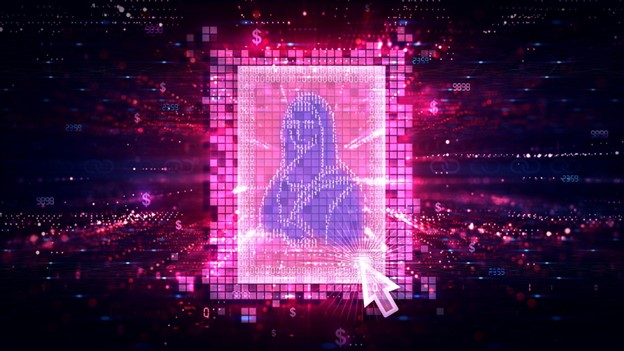Non-Fungible Tokens (NFTs) are digital assets that can be used to establish the ownership and value of an underlying digital asset, such as an original image, video or audio.They are issued on these assets using blockchain technology and smart contracts.They are currently a highly speculative market to invest in, prone to rapid plunges or upswings and cyber security threats, making them enormously volatile assets to acquire and maintain.
NFTs are primarily used to verify ownership since locating and identifying the original owner of work on virtual platforms is difficult, leading to easy replication of work and consequent lowering in value.Hence NFTs are an attempt to impose decentralisation, ownership tracking and value storage.It provides “digital bragging rights” through verifiable proof of ownership.
However, the legality of such digital assets remains a major concern.Apprehensions have been expressed regarding the legal status and the authenticity of such tokens, especially in India and consequently, NFT followers in India have expressed concerns about its long-term viability due to the lack of explicit laws, restricting or preventing Indians from dealing in NFTs.
Legal implications of NFTS
NFTs and cryptocurrencies both use the same ‘blockchain’ technology, and the NFTs are usually acquired using cryptocurrency.Keeping this in mind, analysis of the legality of crypto-currencies becomes important to understand the legal implications of NFTs.
General law
Although cryptocurrency has been present and around in India for the last ten years, the primary debate around its legality began in June 2018, when the Reserve Bank of India (RBI) issued a circular advising banks not to deal in crypto-currencies.However, the Supreme Court struck down this order in Internet and Mobile Association of India vs Reserve Bank of India stating the right to trade is a basic right under the Constitution.
Securities law
Whether trading in NFTs is prohibited under the Securities Contract Regulation Act, 1956 (“SCRA”) is uncertain because there is no formal or legal structure of legislation for NFTs and hence no categorization of NFTs under the SCRA.
Trading in NFTs would be illegal in India if they are considered a derivative.
Under Section 2(ac) of the SCRA, the term “derivative” is defined as “a contract whose value is derived from the prices of the underlying securities”.If NFTs are considered derivatives, they cannot be traded on virtual platforms as per Section 18a of the SCRA, however if an NFT is simply a reference to an existing asset and used as proof of its authenticity, classifying it as derivative would be incorrect.
Copyrights Act
Currently, when the NFT is purchased, the owner does not get the copyright to the underlying piece of art.
According to Section 19 of the Copyright Act of 1957, to transfer copyright and be regarded as an owner, a written sale contract declaring explicit assignment of copyright must be present.
Under Section 14 of the Copyright Act, only the owner of a work has the right “to reproduce and distribute copies of it”.As a result, unless the buyer and seller expressly restrict resale or copying of the NFT, such action may not be accorded protection.
Consequently, the buyer cannot establish ownership over the object unless the owner specifically transfers their rights.
However, the buyer’s digital item will have protection under the Copyright Act from illegal copying or disseminating.
Tax regulations
In most cases, the type of the underlying asset should dictate the tax treatment of NFTs.Example: For income tax and Goods and Services Tax purposes, a digital art NFT could be considered an intangible asset or good and appropriate taxes should be declared and remitted on the same.
All virtual digital assets, including NFTs, are subject to a 30% tax levied by the government.Such high charges may deter novices and traders who are out to make a fast buck, which may force investors to exit the sector, lowering the value of such assets.
Further, NFT transactions are cross-border and digital in nature, therefore new tax problems are popping up every day.
For example, sales of NFTs by offshore sellers to Indian buyers through an offshore NFT marketplace may be subject to a 2 per cent equalisation fee based on the NFT’s gross value and the marketplace’s income from Indian customers.
FEMA Regulations
The classification of the underlying asset being transferred via the NFT, whether physical or digital, would decide their treatment under the Foreign Exchange Management Act and regulations, which regulate cross-border transactions.
Though unclear, NFTs may be categorised as “intangible assets” and governed under the software and intellectual property part of the FEMA regulations.
Hence, determining their location becomes important since they are supported by “global ledgers”, which means the information is logged, shared and synchronised across data stores.
Collective investment schemes
If the main objective of the NFT is to grant the ability to retain, purchase and sell the asset, it is likely to be classified as a utility or exchange token.The issuance of NFTs that qualify as CIS units may require registration and acquisition of a collective investment undertaking licence from the SEBI.
What’s next?
While there is no unique legal framework in India for NFTs; they are usually governed by contract law.The majority of buyers and enthusiasts seek to make quick returns from NFTs and of late interest in them has dwindled.Several Nobel laureates have asserted that crypto-currencies have no intrinsic value, and even compared NFTs to pyramid schemes or Ponzi schemes.
As a result, the sale and purchase of tokenised artwork raises questions about its legality as well as other legal issues like NFT holders’ rights, creator and holder liability, the applicability of various other intersecting laws, and the exhaustion of copyright holders’ rights after the first sale.
The principle of c aveat emptor applies aptly to trade in NFTs and users must be aware of the risks before transacting digitally in NFTs.
(The author is Partner with King Stubb and Kasiva, a law firm)
Published on July 17, 2022.
